

Why China Will Disappoint the Pessimists Yet Again. China’s eagerly anticipated “hard landing” hasn’t happened yet, and recent indicators make me wonder (not for the first time) if it ever will.
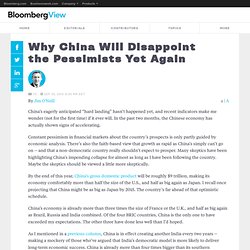
In the past two months, the Chinese economy has actually shown signs of accelerating. Constant pessimism in financial markets about the country’s prospects is only partly guided by economic analysis. There’s also the faith-based view that growth as rapid as China’s simply can’t go on -- and that a non-democratic country really shouldn’t expect to prosper. China at the Crossroads? China’s political future has been settled – for the time-being – with a new cadre of political leaders taking over nearly 3 months ago.
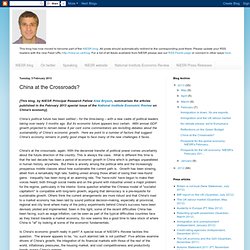
But its economic future appears less certain. Strategize, Adapt, Reform. In an interview, the influential governor of China's central bank retraces 2011 economic policy steps and forecasts the 2012 pace Amid global economic uncertainty, People's Bank of China Governor Zhou Xiaochuan is one of the world's most talked-about central bankers.
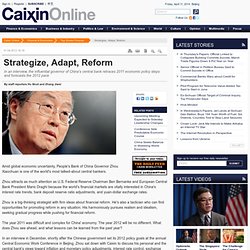
Zhou attracts as much attention as U.S. Federal Reserve Chairman Ben Bernanke and European Central Bank President Mario Draghi because the world's financial markets are vitally interested in China's interest rate trends, bank deposit reserve ratio adjustments, and yuan-dollar exchange rates. Zhou is a big-thinking strategist with firm ideas about financial reform. He's also a tactician who can find opportunities for promoting reform in any situation. The year 2011 was difficult and complex for China' economy. Caixin: China's macro-economic policies were adapted to fit changing economic situations in 2011.
The target of 4 percent inflation set for full-year 2011 may have been hard to achieve. China in the News. While 2011 was a busy year for Europe-watchers, I suspect that 2012 is going to be a big year for China-watchers, at least when it comes to developments that will have the potential to dramatically affect the world's financial system and economy.
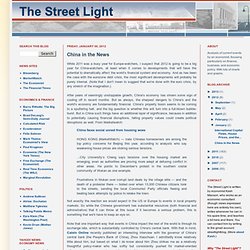
Has China peaked? An exercise in forecasting using Neustadt and May’s History framework « Silberzahn & Jones. China has long been touted as the next leading power, and for many it seems that the question is no longer if China will overtake the US but when.

Recently, however, a number of dissenting opinions have started to be heard. Economists point to the strong imbalances in China’s economy; political analysts observe that the political and social structure is unstable; human right activists warn of increasing censorship and repression, while historians suggest that, like the USSR in the late 80s, China’s communist regime has run its course and is on an unsustainable path. Indeed, “hard landing” stories about China have started to appear, by Roubini or by Gordon Chang. Like any such debate, or lack of debate (instead, it is a series of proclamations), positions are often taken being selective about facts, based on false analogies, shallow extrapolations, ideology, or just plain ignorance.
The first choice is to select the analogs, ie what we should compare China to. Like this: Like Loading... China on the verge? Matías Vernengo It has become increasingly common to suggest that on top of the European debacle and the sluggish recovery in the United States, China might be on the verge of a collapse, and with it the last bastion of economic growth in the world economy would also be gone.
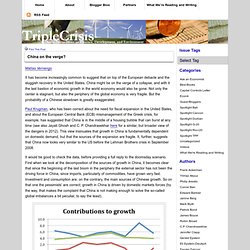
Not only the center is stagnant, but also the periphery of the global economy is very fragile. But the probability of a Chinese slowdown is greatly exaggerated. Paul Krugman, who has been correct about the need for fiscal expansion in the United States, and about the European Central Bank (ECB) mismanagement of the Greek crisis, for example, has suggested that China is in the middle of a housing bubble that can burst at any time (see also Jayati Ghosh and C.
P. It would be good to check the data, before providing a full reply to the doomsday scenario. Further, as the 3rd graph (below) shows it seems that ULC changes have fundamentally followed the variations of real wages. Read this post in Portuguese at INESC. Why India is riskier than China. New Haven, Connecticut - Today, fears are growing that China and India are about to be the next victims of the ongoing global economic carnage.
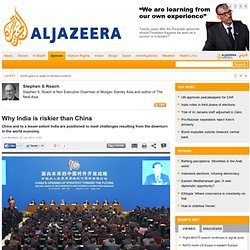
This would have enormous consequences. Asia's developing and newly industrialised economies grew at an 8.5 per cent average annual rate over 2010-11 - nearly triple the 3 per cent growth elsewhere in the world. If China and India are next to fall, Asia would be at risk, and it would be hard to avoid a global recession. In one important sense, these concerns are understandable: both economies depend heavily on the broader global climate. China is sensitive to downside risks to external demand - more relevant than ever since crisis-torn Europe and the United States collectively accounted for 38 per cent of total exports in 2010. Yet fears of hard landings for both economies are overblown, especially regarding China.
While none of these problems should be minimised, they are unlikely to trigger a hard landing. Monetary easing Inflation problem.